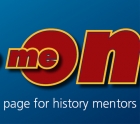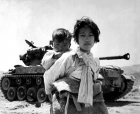Using enquiry questions
Many history departments use enquiry questions as an essential device for structuring their planning. Enquiries – built on the basis of genuine, worthwhile historical questions that the students are ultimately required to answer – often form the basic units within schemes of work, with each enquiry lasting several lessons/weeks. A good question will make clear not only the substantive focus of the enquiry but also the particular second-order or disciplinary concept that the students are dealing with. This approach allows teachers to plan effectively across key stages, clearly identifying where and when they are focusing on particular concepts, making it easier to plan for progression; ensuring, for example, that a Year 9 enquiry question about similarity and difference across the British Empire builds on and extends the analytical framework used to explore similarity and difference in a Year 8 enquiry about the Mughal Empire. The materials in this section include detailed examples of individual schemes of work built around different kinds of enquiry questions, along with examples of larger curriculum plans conceived of in terms of a series of well-designed enquiry questions. Read more
-

Designing an enquiry in a challenging setting
ArticleClick to view -

'...trying to count the stars': using the story of Bergen-Belsen to teach the Holocaust
ArticleClick to view -

Cunning Plan 144: promoting independent student enquiry
ArticleClick to view -

Using ‘Assessment for Learning' to help students assume responsibility
ArticleClick to view -

Pupil-led historical enquiry: what might this actually be?
ArticleClick to view -

A comparative revolution?
ArticleClick to view -

Developing sixth-form students' thinking about historical interpretation
ArticleClick to view -

Move Me On 140: Getting students to generate their own enquiry questions
ArticleClick to view -

History's secret weapon: the enquiry of a disciplined mind
ArticleClick to view -

Into the Key Stage 3 history garden: choosing and planting your enquiry questions
ArticleClick to view -

Emotional response or objective enquiry? Using shared stories and a sense of place
ArticleClick to view -

'ICT Starter for 10' a primer for Secondary History Educators
ArticleClick to view -

Getting Year 7 to set their own questions about the Islamic Empire, 600-1600
ArticleClick to view -

Approaches to planning interpretations-focused enquiries.
ArticleClick to view -

Politics, history and stories about the Cold War
ArticleClick to view -

Making history curious: Using Initial Stimulus Material (ISM) to promote enquiry, thinking and literacy
ArticleClick to view -

Why go on a pilgrimage? Using a concluding enquiry to reinforce and assess earlier learning
ArticleClick to view -

Emotional response or objective enquiry? Using shared stories and a sense of place in the study of interpretations for GCSE
ArticleClick to view

